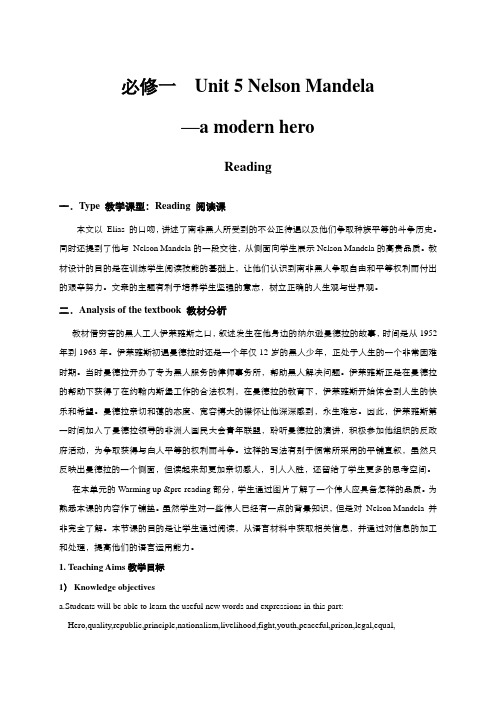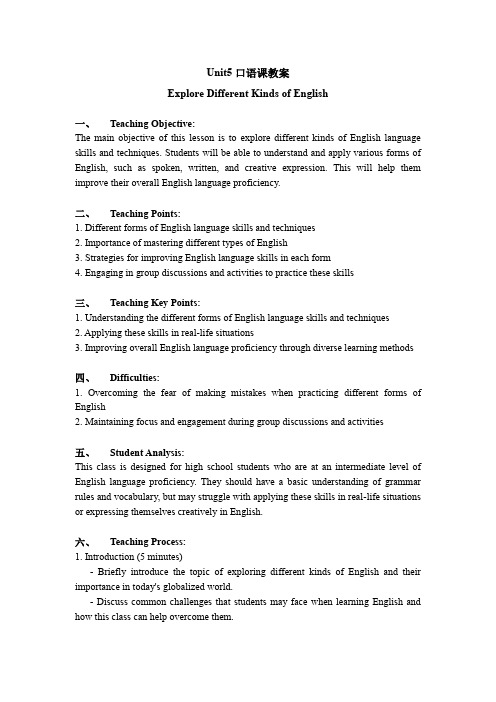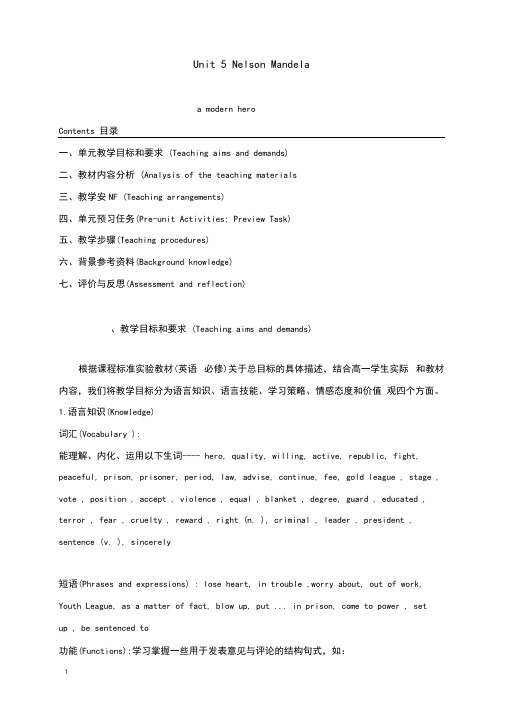人版高中英语必修一_Unit_5教(学)案
人教版高中英语必修一 教案: unit 5 Nelson Mandela--a modern hero Reading

必修一Unit 5 Nelson Mandela—a modern heroReading一.Type 教学课型:Reading 阅读课本文以Elias 的口吻,讲述了南非黑人所受到的不公正待遇以及他们争取种族平等的斗争历史。
同时还提到了他与Nelson Mandela的一段交往,从侧面向学生展示Nelson Mandela的高贵品质。
教材设计的目的是在训练学生阅读技能的基础上,让他们认识到南非黑人争取自由和平等权利而付出的艰辛努力。
文章的主题有利于培养学生坚强的意志,树立正确的人生观与世界观。
二.Analysis of the textbook 教材分析教材借穷苦的黑人工人伊莱雅斯之口,叙述发生在他身边的纳尔逊曼德拉的故事,时间是从1952年到1963年。
伊莱雅斯初遇曼德拉时还是一个年仅12岁的黑人少年,正处于人生的一个非常困难时期。
当时曼德拉开办了专为黑人服务的侓师事务所,帮助黑人解决问题。
伊莱雅斯正是在曼德拉的帮助下获得了在约翰内斯堡工作的合法权利,在曼德拉的教育下,伊莱雅斯开始体会到人生的快乐和希望。
曼德拉亲切和蔼的态度、宽容博大的襟怀让他深深感到,永生难忘。
因此,伊莱雅斯第一时间加入了曼德拉领导的非洲人国民大会青年联盟,聆听曼德拉的演讲,积极参加他组织的反政府活动,为争取获得与白人平等的权利而斗争。
这样的写法有别于惯常所采用的平铺直叙,虽然只反映出曼德拉的一个侧面,但读起来却更加亲切感人,引人入胜,还留给了学生更多的思考空间。
在本单元的Warming up &pre-reading部分,学生通过图片了解了一个伟人应具备怎样的品质。
为熟悉本课的内容作了铺垫。
虽然学生对一些伟人已经有一点的背景知识,但是对Nelson Mandela 并非完全了解。
本节课的目的是让学生通过阅读,从语言材料中获取相关信息,并通过对信息的加工和处理,提高他们的语言运用能力。
1. Teaching Aims教学目标1)Knowledge objectivesa.Students will be able to learn the useful new words and expressions in this part:Hero,quality,republic,principle,nationalism,livelihood,fight,youth,peaceful,prison,legal,equal,law,advise,continue,gold,passbook,ANC,league,stage,vote,position,accept,violence,devote,vote, guidance, blow up, in troubleb. Enable the students to read Elias’ storyc. Guide the students to know the qualities of Nelson Mandela as a great leader2) Ability objectivesa.Develop the students ’reading skills, such as fast reading ,careful reading and summarizingb.Improve the students’ comprehension ability3) Emotion objectivesa,Understand the qualities great person have in common and learn the fine qualities from themb.Develop the students’ moral quality2.Teaching important points教学重点a.Enable the students to read Elias’ story and Learn to grasp the main idea of the text.b.Enable students to talk about the fine qualities of great people,especially Nelson Mandelac.Improve the students’ reading ability3.Teaching difficult points 教学难点a.How to grasp the main idea of the text.b.How to help develop students’ reading abilityc.How to help students learn from Nelson Mandela4.Teaching methods 教学方法a.Student-centeredb.Task-based teaching method(任务型教学)c.Discussion5.Learning methods 学习方法Individual or pair work and group work6.Teaching Aids 教具准备The multimedia三.教学设计1. 总体思路本堂课的主要内容分为四大部分,Pre-reading(阅读前活动) ,while –reading(阅读中活动),post-reading(阅读后活动)以及discussion(讨论) and role play 。
Unit5+口语课教案 高中英语人教版(2019)必修第一册 (1)

Unit5口语课教案Explore Different Kinds of English一、Teaching Objective:The main objective of this lesson is to explore different kinds of English language skills and techniques. Students will be able to understand and apply various forms of English, such as spoken, written, and creative expression. This will help them improve their overall English language proficiency.二、Teaching Points:1. Different forms of English language skills and techniques2. Importance of mastering different types of English3. Strategies for improving English language skills in each form4. Engaging in group discussions and activities to practice these skills三、Teaching Key Points:1. Understanding the different forms of English language skills and techniques2. Applying these skills in real-life situations3. Improving overall English language proficiency through diverse learning methods四、Difficulties:1. Overcoming the fear of making mistakes when practicing different forms of English2. Maintaining focus and engagement during group discussions and activities五、Student Analysis:This class is designed for high school students who are at an intermediate level of English language proficiency. They should have a basic understanding of grammar rules and vocabulary, but may struggle with applying these skills in real-life situations or expressing themselves creatively in English.六、Teaching Process:1. Introduction (5 minutes)-Briefly introduce the topic of exploring different kinds of English and their importance in today's globalized world.- Discuss common challenges that students may face when learning English and how this class can help overcome them.2. Formative Assessment (10 minutes)-Have students work in pairs to discuss their favorite ways to practice English (e.g., reading, writing, listening, speaking) and why they enjoy these activities.-Encourage students to share examples of how they have used English in their daily lives.3. Learning Objectives (15 minutes)-Introduce the different forms of English language skills and techniques (e.g., spoken, written, creative expression).-Discuss the benefits of mastering each form and how it can improve overall English language proficiency.- Provide examples of each form and discuss strategies for improving each skill.4. Application (20 minutes)-Break students into small groups and assign each group a specific form of English language skill or technique to explore (e.g., poetry writing, storytelling, debate).- Have students engage in group discussions and activities related to their assigned skill, using a variety of resources (e.g., books, articles, videos).- Encourage students to share their findings with the class and provide feedback on each other's work.5. Closing (5 minutes)- Review the key points covered in the lesson and emphasize the importance of practicing different forms of English in order to improve overall proficiency.- Ask students to reflect on what they learned in this lesson and what they plan to do differently moving forward to improve their English language skills.七、Homework:1. Write a reflection paper on the different forms of English language skills and techniques covered in the lesson. Discuss how you can apply these skills in your own life to improve your overall English language proficiency.2. Practice a new form of English language skill or technique outside of school by setting aside time each day to engage in the activity (e.g., reading a book in English, watching a movie without subtitles, joining an online forum to practice writing).3. Share your progress with your teacher or classmates by presenting your reflection paper or sharing your experiences practicing a new form of English language skill or technique.。
高中英语人教版 选择性必修第一册教案讲义:UNIT 5 WORKING THE LAND

UNIT 5WORKING THE LAND主题语境人与社会——自然科学研究之伟大成就背景导入:袁隆平是我国研究与发展杂交水稻的开创者,也是世界上第一个成功利用水稻杂种优势的科学家,被誉为“杂交水稻之父”。
几十年来,他不仅解决了中国十几亿人口的吃饭问题,保证了国家粮食安全,还为世界粮食供给作出了杰出贡献。
The third generation hybrid rice (第三代杂交水稻)The final yield①of the tested variety, G3-1S/P19, came to 1,046.3kg per mu(about 667 square meters), based on two plots of land in Qingzhu Village under the city of Hengyang in central China's Hunan Province.Experts agreed that the rice has a stout stem (茎秆粗壮), fertilizer tolerance②,lodging resistance③,large spike and more grains.Unlike the previous④ two generations that required a large amount of water and fertilizers as well as demanding growing conditions and technological support, the third-generation hybrid rice is easier to be cultivated⑤ by ordinary farmers.One of the most important characteristics⑥ of the third-generation hybrid rice is that it has a shorter growing period. Some previous high-yielding⑦ hybrid rice varieties in China took 160 to even 180 days from sowing⑧ to harvesting, while the figure was shortened⑨ to around 125 days for the new variety.A shorter growth period can reduce the use of pesticides (农药) and fertilizers, thus reducing cost and improving production efficiency⑩.China now feeds around 20 percent of the world's population with less than 9 percent of theworld's arable land (耕地).Yuan Longping, who developed the world's first hybrid rice in the 1970s, has set multiple (混合的) world records in hybrid rice yields in previous years, making great contributions to the food security⑪ of China and the world.Yuan said:“The third-generation hybrid rice has the comprehensive⑫strength to promote⑬ a greener and more sustainable⑭ development of China's rice production with higher quality and yield.”①yield n.收益;产量②fertilizer tolerance 耐肥③lodging resistance 抗倒④previous adj.原先的;以前的⑤cultivate v t.种植⑥characteristic n.特征⑦high-yielding adj.高产的⑧sow v.播种⑨shorten v.缩短⑩efficiency n.效率⑪security n.保证;安全⑫comprehensive adj.综合的⑬promote v t.推进;促进⑭sustainable adj.可持续的[随手记]Section ⅠReading and Thinking每/日/金/句:My lifelong pursuit is to keep all the people away from hunger.—Yuan Longping 我毕生的梦想是让所有人远离饥饿。
最新人教版高中英语必修一unit5《nelsonmandela》全单元教案.doc

Unit 5 Nelson Mandelaa modern heroContents 目录一、单元教学目标和要求(Teaching aims and demands)二、教材内容分析 (Analysis of the teaching materials三、教学安NF (Teaching arrangements)四、单元预习任务(Pre-unit Activities: Preview Task)五、教学步骤(Teaching procedures)六、背景参考资料(Background knowledge)七、评价与反思(Assessment and reflection)、教学目标和要求(Teaching aims and demands)根据课程标准实验教材(英语必修)关于总目标的具体描述,结合高一学生实际和教材内容,我们将教学目标分为语言知识、语言技能、学习策略、情感态度和价值观四个方面。
1.语言知识(Knowledge)词汇(Vocabulary ):能理解、内化、运用以下生词---- hero, quality, willing, active, republic, fight, peaceful, prison, prisoner, period, law, advise, continue, fee, gold league , stage , vote , position , accept , violence , equal , blanket , degree, guard , educated , terror , fear , cruelty , reward , right (n. ), criminal , leader , president , sentence (v. ), sincerely短语(Phrases and expressions) : lose heart, in trouble ,worry about, out of work, Youth League, as a matter of fact, blow up, put ... in prison, come to power , setup , be sentenced to功能(Functions):学习掌握一些用于发表意见与评论的结构句式,如:1. 发表意见(Giving opinions )Why do you think so? What do you think of …? What's you opinion?agree / don't agree. I think / don't think .... I prefer .... In myopinion ....I'm afraid ....2.评论(Making comments)Good idea! That's an excellent idea .语法(Grammar):定语从句(II )(由where, when, why, 介词+ which, 介词+ whom引导的定语从句)The school where I studied only two years was three kilometres awayThis was a time when you had got to have a passbook to live in JohannesburgThe reason why I got a job was because of my hard work .•••we were put in a position in which we had either to accept we were less important, or fight the Government .The person to whomyou should be grateful for a peaceful South Africa is Nelson Mandela.扩展词汇:negative(消极的),heroine(女主角,女主人公),unwilling(不情愿的),nation(国家,民族),sacrifice(牺牲),realize (认识到),give up (放弃),riches (财富),Bible (圣经),revolution (革命),career (职业),equality (平等),fairness(公平),conflict (冲突),biography (自传),beliefs (信仰),Christianity (基督教),religion (宗教),priests (牧师),version (翻译),readable (易读的),adventure (冒险),scholar (学者),sympathy (同情),,campaign (从事活动),communist (共产主义者),injustice (不公平),oppose (反对),pilot(飞行员) , boycott (联合抵制)2.语言技能(Skills)听:在本单元的课文及练习册听力教学中,能听懂人物和事件以及它们的关系,能抓住所听语段中的关键词,正确理解话语间的逻辑关系。
2019人教版高中英语必修一Unit5 Useful Structures 教学设计

Unit5 Discovering Useful Structures 名师教学设计●课时内容Describe your favourite thing主题语境:人与自我主题群:生活与学习子主题:语言学习规律和方法:德语学习经历和优点语篇类型:文本、故事文本分析:本节课设计了四个活动,第一部分为四个含有定语从句的句子,第二部分使用定语从句造句,第三部分为一段作者学习德语的经历,第四部分使用定语从句谈论自己喜欢和不喜欢的事。
本课的主要特点是把语法学习融人主题意义探究的过程中,提高学生话言学习的能力,发展学生的语言思维能力●课时目标1.识别出由“关系副词和介词十关系代词”引导的定语从句。
2.使用定语从句表达自己喜欢的事物和人。
●重点难点重点:理解“关系副词和介词+关系代词”引导的定语从句。
难点:在语境中使用“关系副词或介词+关系代词”引导定语从句。
●教学准备教师准备:定语从句的相关练习学生准备:利用语法书、网络等学习关系副词引导定语从句的用法。
●教学过程StepⅠ学习理解活动一:复习关系代词引导的定语从句用关系代词填空。
(答案可能不唯一)(that,which,who,whom,whose)1. This is the man _____ wants to see you.2. The student _____ answered the question is Zhang Hua.3. The man _____ you went to see has come.4. The runner _____ you are asking about is over there.5. The person _____ you should write to is Mr. Ball.6. The man _____ was passing by saw what happened.7. Here is the pen _____ you lost the day before yesterday.8. These books _____ you lent me were very useful.9. The storybook _____ I have just read cannot be easily forgotten.10. A clock is a machine _____ tells people the time.Suggested answers:1. who/that2. who/that3. whom/that4. whom/that5. whom/that6. who/that7. which/that8. which/that9. which/that 10. which/that 活动二:识别时态(SB,P64,Part1)1. Understand the sentences. Ask students to read the four sentences and translate it into Chinese to understand their meaning.2. Recognize the tense. Ask students to work in groups first to underline the restrictive relative clauses and discuss the tense and try to analyze how it is used.【设计意图】通过翻译句子,讨论时态,教师适当讲解,学生在学习过关系代词引导的定语从句之后,进一步理解关系副词引导的定语从句。
2020年新人教版高中英语必修一《Unit 5 Languages Around the World》单元教案(附导学案)2

《Unit 5 Languages Around the World》单元教案Unit 5 Languages Around the World-Listening and Speaking【教材分析】不同于旧教材,语言差异在必修一的第二单元,新教材设置在必修一最后一个单元,可以让学生在语言上有所储备,就是在前几个单元的学习中,既有语言知识,也有语音知识,到了这个时候学生就能够有话可说,有感可发,能够找到不同国家英语的区别。
让学生学习不同国家和地区的英语,就可以培养学生的国际视野,可以降低学习英语的恐惧感,也可以让学生明确自己的目标。
【教学目标与核心素养】1.语言能力目标新课标重视培养学生语言的使用能力,本单元通过听来带动说,和平时生活紧密相关,让学生可以体会到不同国家使用英语的过程中会有不同的口音,中式英语也肯定具有它的特点,但是作为语言学习者,我们应该尽量模仿英美国家使用语言的地道性,这样可以拓展学生的国际视野,有助于下一步的开展跨文化交流。
2.学习能力目标:在听力当中,学生应该有效规划学习方法,选择恰当的策略与方法。
这节课,教师可以侧重培养在听的过程中让学生记录关键信息,写下关键词的训练,让学生不是为了做题而听听力造成的紧张感,又不能在听的过程中只见树木不见森林。
【教学重点】(1)在听的过程中先听懂,然后快速记录下关键信息,并通过交换信息来获取更多信息;(2)明确自己要听的主要内容集中精力抓住重点。
【教学难点】(1)听力中涉及到数字一直是学生听力的难点,要让他们对于20以内的数字比较熟悉,才能听到之后立马反应过来;(2)听一次后能记住的信息并不多,在第二遍或者第三遍当中继续积累。
【教学过程】Unit 5 Languages Around the World-Reading and Thinking【教材分析】本节课是高中英语第一册的最后一个单元的阅读和思考部分,文章难度明显增加,体现在以下几个方面:文章题材是说明文,比较难理解;话题生疏,涉及到历史等知识;生词量增大,而且在语境中理解词汇的要求提高。
英语人教版高中必修一 教案Unit 5 Discovering Useful Structures
Unit 5 Languages Around the WorldPeriod 3 Discovering Useful Structures教材分析本节课为语法课,主题为“描述你喜欢的事物”(Describe your favorite things)。
教学内容为限制性定语从句和关系副词when,where,why,介词+which的用法。
首先,通过观察上一课时“Reading and Thinking”课文中出现的句子,要求学生归纳限制性定语从句中关系副词的用法。
接着,通过完成单句填空、语篇填空等练习帮助学生更加熟练地掌握限制性定语从句中关系副词的用法。
最后,通过真实语境,进行语言输出。
利用定语从句准确表达自己的喜好,描述最喜欢的人、物、时间、地点、原因等。
教学目标在本课学习结束时,学生能够:1. 观察和归纳限制性定语从句中关系副词when,where,why,介词+which的用法。
2. 运用定语从句的语法知识,理解语境、语篇意义。
3. 运用定语从句表达看法和描述喜好。
教学重难点【教学重点】1. 掌握限制性定语从句中关系词的用法。
2. 理解含有限制性定语从句的语篇。
【教学难点】运用定语从句,准确描述喜好。
教学过程Step 1 Warming-up1. When does written Chinese language date back to?2. What is longgu?Step 2 ObservingRead the sentences from the passage and underline the restrictive clauses.设计意图:学生观察句子,复习限制性定语从句,找到由关系副词引导的限制性定语从句。
Step 3 Grammar SummaryRead the grammar notes on P110 and P111.设计意图:讲解课后P110-P111的语法要点,学习关系副词引导的限制性定语从句。
人教版高中英语必修一Unit5教案
Unit 5 NelsonMandela——a modernhero教材分析:本单元以NelsonMandela—— a modernhero为话题,目的在于使学生了解一个伟大的人应具备怎样的品质,学会表达自己的观点,并用所学的句型来描写一个伟人。
Teachin g aims:1. To arouseSs’interes t in learnin g about heroesin history2. To developSs’listeni ng and speakin g ability.Teachin g procedu res:Step1 warming up●Describ e yoursel vesFirst what kind of personare you? (shy, outgoin g, fun, mean, immatur e, nice, kind, honest,brave, loyal, happy, wise, smart, friendl y, warm, cheerfu l, popular, generou s, hard-working, diligen t, weak, stupid, lazy, dishone st, tense, cold, unkind, miserab le, dull, strong-minded, determi ned etc.)●Discuss ion (Encoura ge student s to give five or six qualiti es that they think greatpersons have, and give their reasons.)● Questio n 1: Who do you think are the greates t men in your mind? Can you namesome?Questio n 2: In what way do you conside r a man is a great? What is your standar d?●Look at page 33 and then ask the Ss if these famouspeopleare great people.●Conclus ion:A great personis a personwho has followe d his or her ideas and sacrifi ced(牺牲) somethi ng so that they could be realize d. A pop singermay be very popular with the young people, but he/she is not a great man/woman.A famouspersonmay be well-known but if he or she has not gone through struggl es and difficu ltiesfor their noble aims, they can not be calleda great person.Step2 languag e points:1.devotevtoneself to 献身于、致力于。
人教版高中英语必修一教案Unit 5 Nelson Mandela (含答案)
Unit 5 Nelson Mandela—a modern hero I.单元教学目标II.目标语言III. 教材分析和教材重组I. 教材分析本单元以Nelson Mandela —— a modern hero 为话题,目的在于使学生了解一个伟大的人应具备怎样的品质,学会表达自己的观点,并用所学的句型来描写一个伟人。
1.1 Warming Up列出一些形容词让学生判断一下哪些可以用来描述伟大的人,一个伟大的人应具备怎样的品质。
1.2 Pre-reading给学生提供了六个名人的图片,要求利用图片下面标注的人物的重要事迹以及学生对他们的了解,来判断这六个人谁是伟人,谁是重要的人但不是伟人。
1.3 Reading介绍Elias的生平,向学生展示Nelson Mandela是一个怎样的人。
这是一篇记叙文,让学生学会利用时间顺序描述一个人一生的主要活动。
1.4 Comprehending练习1和3帮助学生利用判断正误和时间顺序来整体理解课文。
练习2和4要求学生进一步了解课文细节。
1.5 Learning about Language分词汇和语法两部分。
其中Discovery useful words and expressions是根据课文语境在运用中掌握词汇,Grammar是有关关系副词where, when, why以及“介词+关系代词”引导定语从句的用法,并通过练习加以巩固。
1.6 Using Language分为三部分,一是Listening,练习听力可配合P72的Listening Task进行。
二是Reading,这也是一篇精读文章,更详细地了解曼德拉。
三是Writing,要求利用时间顺序简要地描述一个人。
2. 教材重组2.1 因本教材重点强调的是阅读能力,故将Reading, Comprehending,Using Language 中的Reading合在一起设计成一节“阅读课”(一)(精读课)。
【教案】Unit+5Listening+and+speaking+教学设计人教版高中英语必修第一册
主题单元分课时教学设计课题指向学科核心素养的高中英语主题式教学 (第1 课时)课时类型Listening and Speaking学时40分钟教学素材PPT, 视频资料;黑板;指导思想和理论依据1.主题为语言学习提供主题范围或主题语境。
学生对主题意义的探究应是学生学习语言的重要内容,直接影响学生语篇理解的程度、思维发展水平或语言学习的成效。
语言技能是语言运用能力的重要组成部分。
学生应通过大量的专项和综合性语言实践活动,发展语言技能,提升认知策略技能——在语境中学习词汇和语法。
2.设计理念重点在于从传统的讲解式的被动式学习转变成语法知识的积极主动的体验式学习,突出语篇和主题的功能性,培养学生积极探索的学习意识内容分析/语篇研读/文本分析本课内容的主题语境属于:人与社会—探索世界上的语言,主题活动为一段关于“learn a foreign language”的演讲。
要求学生通过听一段介绍语言和语言学习的演讲,了解联合国的工作语言,并和同伴探What听力文本是一段演讲,信息量较大,介绍了世界上的语言数量、母语使用人数最多的语言,以及当代年轻人学习外语的动机和理由等内容。
作为演讲文体,文本语言注重节奏,讲究对转折、欲扬先抑等技巧的运用,以制造兴奋点、吸引注意力,引起青年听众的共鸣,并逐步引导听众随着演讲者的陈述,分析和思考相关的内容。
文本从学生把英语学习视作唯一的外语学习说起,首段运用了表示转折和表达观点的多种句式,例如:“it seems that the only ...""There ar...”"However ...”“But it is very wise to learn ...”,等等。
这些带有转折意味的句子环环相扣,能有效地吸引听众跟随演讲者的思路,关注演讲内容。
接下来文本通过将介绍联合国的六种工作语言与语言学习相结合,启发学生从国际视野的角度思考自身的语言学习。
- 1、下载文档前请自行甄别文档内容的完整性,平台不提供额外的编辑、内容补充、找答案等附加服务。
- 2、"仅部分预览"的文档,不可在线预览部分如存在完整性等问题,可反馈申请退款(可完整预览的文档不适用该条件!)。
- 3、如文档侵犯您的权益,请联系客服反馈,我们会尽快为您处理(人工客服工作时间:9:00-18:30)。
Unit 5 Nelson Mandela——a modern hero教材分析:本单元以 Nelson Mandela —— a modern hero 为话题,目的在于使学生了解一个伟大的人应具备怎样的品质,学会表达自己的观点,并用所学的句型来描写一个伟人。
提示:1、本单元从warm-up开始,到最后的writing,都是以第三人称的角度来进行描述的,因此,教学中要注意这种人称的前后一致,否则无法前后一致的引导学生进行学习和表达。
2、Reading部分侧重于理解,以及理解基础上的summary,这为最后的writing做好的铺垫和积累(尤其是关键单词、句型和结构的积累),最后的writing要是前面阅读后的仿写(当然能力较强的学生也可以不受限制的开展写作)。
3、如何激发学生学习关于这些伟人的文章,是需要教师思考的:这些伟人学生会感兴趣吗?学生了解多少关于这几位伟人的伟大业绩?从哪些角度来导入会让学生更加的感兴趣?4、教学目标建议增加:通过学习文章和相关素材,进一步了解伟人的生平事迹,尤其是如何才能成为伟人。
培养学生初步使用相关词汇、句型和文章结构进行人物生平描述的口语表达和基础写作能力。
Teaching aims:1. To arouse Ss’ interest in learning about heroes in history2. To develop Ss’ listening and speaking ability.Teaching procedures:Step1 warming up●Describe yourselvesFirst what kind of person are you? (shy, outgoing, fun, mean, immature, nice, kind, honest, brave, loyal, happy, wise, smart, friendly, warm, cheerful, popular, generous, hard-working, diligent, weak, stupid, lazy, dishonest, tense, cold, unkind, miserable, dull, strong-minded, determined etc.)●Discussion (Encourage students to give five or six qualities that theythink great persons have, and give their reasons.)提示:What kind of great persons? Politicians, scientists, or? Different kinds of great persons, different qualities.Question 1: Who do you think are the greatest men in your mind? Can you name some?Question 2: In what way do you consider a man is a great? What is your standard?●Look at page 33 and then ask the Ss if these famous people are greatpeople.●Conclusion:A great person is a person who has followed his or her ideas and sacrificed(牺牲) something so that they could be realized. A pop singer may be very popular with the young people, but he/she is not a great man/woman.A famous person may be well-known but if he or she has not gone through struggles and difficulties for their noble aims, they can not be called a great person.Step2 language points:1. devote vtoneself to 献身于、致力于。
devote one’s life/one’s time to….把生命、时间献给。
…to …把。
用于。
E.g. He devoted his life to promoting world peace.He devoted his life to the promotion of world peace.devoted adj 忠实的, 深爱的be devoted to 对…忠实, 对…深爱a devoted friendShe is devoted to her husband.即学即练The manager devotes all his spare time ______ the violin. B A. to practise B. to practising C. in practising D.for practising2. fight for 为……而战fight against 与……作斗争;与…作战fight with 同…并肩作战; 与… 作战E.g. We will have to fight against difficulties.I’ll fight with you, in other words, I’ll support you.Slaves were fighting for freedom.3. give up 表示主动放弃或屈服e.g. He has decided to give up smoking.give in 表示被动屈服或认输,后面不带宾语。
如果接宾语用give in to e.g. You can’t win the game, so you may as well give in.The second period-----extensive readingTeaching aims:1) To have Ss learn about some information about Nelson Mandela and the situation where the black was badly or unfairly treated.2) To get Ss to learn about reason why Nelson Mandela helped the black people to get the same right as white people.Teaching procedures:Step1 make prediction:Read the title of the text and guess what kind of writing the text is. (Narrative writing)Step2 scanning: read the text quickly and then decide how many parts this text can be divided into and then give the main ideas of each part. Part 1(Para. 1---2) The life of Elias’ before he met Nelson MandelaPart 2(Para.3---5) The change of Alias life after he met Nelson Mandela and what Mandela did.Step 3 skimming:Scan the test specific information to finish comprehending part.Step 4Let’s go over the text once more to make a diagram of it with key wordsHomework1. Go over the “Reading” and find out the useful expressions in it.The third period----intensive readingLanguage points:1. The time when I first met Nelson Mandela was a very difficult period of my life.when 在句子中引导的是时间定语从句。
when 指时间,在定语从句中做时间状语: e.g. I still remember the day when I first came to the school.The time when we got together finally came.2. It was in 1952 and Mandela was the black lawyer to whom I went for advice. advice n. a piece of advice 一条建议 ask for advice 征求意见give sb. advice on…关于…给某人建议advise v.1) advise sb. on/ about sth. 就……给某人出主意e.g. I have advised you on that subject.2) advise sb. to do sth. 建议某人干……e.g. Our monitor advises me to practice more spoken English.3)advise doing sth 建议做某事e.g. I advise waiting until tomorrow.4) advise that + (should) doe.g. I advise that you (should) not eat fruit that isn’t ripe.即学即练I ____ my father to give up smoking, but he didn’t think it was necessary. AA. advisedB. hopedC. persuadedD. suggested提示:这种“即学即练”对于学生来说能锻炼什么呢?我觉得还是练习阅读理解的,不是练习词义选择的。
